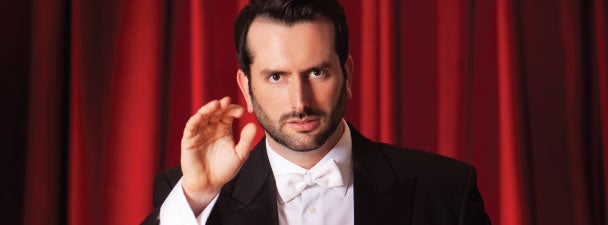 When was the last time you went to an opera?
When was the last time you went to an opera?
Yeah, that’s exactly what Andres Cladera ’99 thought. And he’s hoping to change that.
“We’re trying to take the stigma out of opera,” Cladera says.
You know the stigma he’s talking about: the horns, the helmet, the stuffy culture, the overblown acting. And, of course, the singing fat lady.
“We want to shake operas up, do them in a small setting where people can see the opera singers, see the orchestra and actually connect,” says Cladera, the co-founder and artistic director of the aptly named Microscopic Opera Company.
Performing its extremely intimate chamber operas in off-beat venues in Pittsburgh, Pa., where audiences can see every breath and hear every creak in the stage, Microscopic Opera Company takes everything you thought you knew about opera and flips it on its head.
Cladera’s mission is to expose unusual suspects to the centuries-old art form through intimate and cutting-edge chamber performances. And his vision tests the boundaries of both form and function. Consider some of his recent work: an opera about Julia Child, an adaption of Roald Dahl’s famous book The Fantastic Mr. Fox and two productions based on science fiction novels.
 And such creativity is working. The Microscopic Opera Company “attracts people who like the idea of opera being different,” says Cladera, who often holds post-show discussions with his audience. He recently learned after a production of Three Decembers that four out of five of those in attendance had never previously been to an opera.
And such creativity is working. The Microscopic Opera Company “attracts people who like the idea of opera being different,” says Cladera, who often holds post-show discussions with his audience. He recently learned after a production of Three Decembers that four out of five of those in attendance had never previously been to an opera.
Cladera himself was just a child when he not only saw, but also performed in his first opera, Massenet’s Werther, in his native Uruguay.
“From then on, I knew I wanted to be in the world of opera,” says Cladera, who became a conductor in Uruguay and calls his transfer to the College a few years later (in 1995) “a bit of a detour.”
But it was a happy one: The dual degrees in piano and vocal performance that he earned at the College led him to an audition at Carnegie Mellon in Pittsburgh, where he then earned his master’s in orchestral conducting.
“It was going back to my roots in a sense,” he says. “I’m more of a social person, so being a pianist was just not enough – I needed the interaction with other people.”
Cladera is passionate about performing contemporary music as opposed to traditional scores because he thinks it’s important to promote living composers. “It’s so hard for them to get funding,” he explains. “And this is the work that people will look back on a hundred years from now in the same way that we look back and are inspired by the past.”
It’s also an “incredible artistic thrill,” Cladera says, to be able to collaborate directly with a composer and bring a “blank canvas” to life.
But Cladera’s work is not without its challenges. Just as composers today are struggling to get their work from the page to the stage, Cladera, who is also artistic director for Renaissance City Choirs, Pittsburgh’s only GLBT choir, is under the same pressure.
“It’s a fine balance between the artistic work and the background, or business, work that allows you to do the artistic. And it’s harder and harder to get people to give you money,” he says, adding that– despite the challenges of fundraising – Pittsburgh is a “city of foundations” that’s extremely supportive of the arts.
Here’s hoping Denver is the same way, as the former Outstanding Young Conductor of the Association of Choral Directors of America (2007) recently moved from Pittsburgh to the Mile-High City, where he is joining his partner and planning to expand Microscopic Opera.
“It will definitely be a challenge,” says Cladera, who will continue to fly back to Pittsburgh for Microscopic Opera performances. “It’s a little bit like starting over: It’s building all new relationships, finding all new sources of funding and discovering all new talent.”
And, of course, breaking down age-old barriers to cultivate a love of opera in a new community – for a new audience.
All in all, says Cladera, “It’s an amazing opportunity.”
– Abi Nicholas ’07
Photo by Duane Rieder




